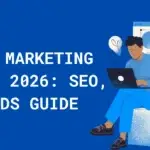The SEO landscape is evolving faster than ever. By 2026, businesses will need to adapt to AI-driven search engines, zero-click results, and voice and visual search to maintain visibility online. Traditional keyword-focused strategies alone will no longer suffice; marketers must focus on holistic, data-driven, and user-centric approaches to rank effectively.
1. AI-Powered Search: The New SEO Frontier
Artificial intelligence is revolutionizing search. By 2026, search engines will rely heavily on AI to interpret user intent and provide direct, precise answers.
Predictive results: AI will anticipate user queries before they are fully typed, presenting answers instantly.
Semantic understanding: Search engines will prioritize context and meaning over exact keyword matches.
Generative AI content: AI-driven summaries and featured snippets will dominate search results, reducing clicks to websites.
Actionable tip: Optimize for user intent, not just keywords. Use structured data (schema markup) to make content understandable for AI and search engines.
2. Zero-Click Search and Featured Snippets
Zero-click searches—where users get answers without visiting your site—are on the rise. Examples include featured snippets, knowledge panels, and answer boxes.
Studies show that over 60% of searches result in zero clicks.
Brands can still benefit by optimizing for featured snippets and being the authoritative source of information.
FAQ sections, bullet lists, and clear headings improve chances of being selected as a snippet.
Actionable tip: Structure content to answer questions directly. Use concise headings, numbered lists, and tables for AI to easily extract answers.
3. Voice and Visual Search Optimization
By 2026, voice assistants like Siri, Alexa, and Google Assistant, as well as visual search tools like Google Lens and Pinterest Lens, will transform how users find information.
Voice search: Focus on natural, conversational language. Optimize for long-tail, question-based queries.
Visual search: Use high-quality images with optimized alt text, descriptive filenames, and structured metadata.
Mobile-first indexing: Ensure your website performs flawlessly on mobile devices.
Actionable tip: Incorporate FAQs, conversational content, and rich media to capture these emerging search formats.
4. AI-Enhanced Content Strategy
AI will not only influence search but also content creation and evaluation. Search engines will assess content quality based on relevance, depth, originality, and engagement metrics rather than keyword density.
Use AI tools to identify trending topics, content gaps, and user intent patterns.
Focus on expertise, authority, and trustworthiness (E-A-T) signals.
Invest in interactive content like videos, infographics, and quizzes to increase dwell time.
Actionable tip: Blend AI insights with human creativity. Produce content that satisfies intent and adds value, rather than just following algorithmic rules.
5. First-Party Data and Privacy-Focused SEO
Privacy regulations and the decline of third-party cookies are reshaping how businesses collect and use data. By 2026, SEOstrategies will need to rely on first-party data.
Collect user data ethically via subscriptions, newsletters, and engagement forms.
Build trust with transparent privacy policies and consent-driven tracking.
Analyze behavioral data to refine keyword strategies, user journeys, and content personalization.
Actionable tip: Focus on privacy-compliant analytics, leveraging first-party data to understand visitor behavior and improve SEO performance.
6. Technical SEO in the AI Era
Technical SEO remains critical, but AI-driven ranking systems demand higher standards:
Core Web Vitals: Speed, stability, and interactivity are crucial for user experience.
Structured data: Help AI understand your content for rich results.
Content depth and site architecture: Ensure clear internal linking and topical relevance.
Multimodal content: Optimize videos, images, and audio for search engines.
Actionable tip: Conduct regular technical audits, optimize for speed and UX, and ensure AI can easily interpret your content hierarchy.
7. Local and Hyper-Personalized SEO
Local search and personalization will become even more important in 2026.
AI will deliver hyper-local results based on user preferences, location, and behavior.
Google Business Profiles and localized content will be crucial for SMEs.
Personalized recommendations will influence rankings in a zero-click world.
Actionable tip: Create local landing pages, optimize Google Business Listings, and leverage first-party data to personalize content for different audience segments.
Conclusion
SEO in 2026 will be defined by AI-driven search, zero-click results, and user-centric strategies. To remain competitive, businesses must focus on intent-based content, technical excellence, voice and visual search optimization, and privacy-compliant data practices. Success will favor brands that combine innovation with authenticity, leveraging AI insights while delivering real value to users. Staying adaptable, investing in rich content formats, and optimizing for emerging search behaviors will ensure visibility and growth in the evolving digital landscape.
Frequently Asked Questions (FAQ)
1. What is zero-click search and how does it affect SEO?
Zero-click search occurs when users get the answer directly on the search page without visiting your website. While it may reduce traffic, it increases brand visibility. Optimizing for featured snippets ensures your content is authoritative and visible.
2. How can AI improve my SEO strategy?
AI helps analyze user behavior, predict trends, identify content gaps, and optimize content for intent rather than keywords. It enables smarter content creation and more accurate targeting.
3. How do I optimize for voice search in 2026?
Use natural language, long-tail conversational queries, FAQs, and concise answers. Mobile-friendly design and fast-loading pages are essential for voice search.
4. Will visual search replace traditional SEO?
Not completely, but visual search will complement traditional SEO. Optimizing images with descriptive filenames, alt text, and structured metadata increases visibility in visual search results.
5. How do I rank in a privacy-first SEO world?
Focus on first-party data collection, user consent, and ethical analytics. Personalize experiences based on direct engagement and optimize content for user intent rather than relying on third-party data.


